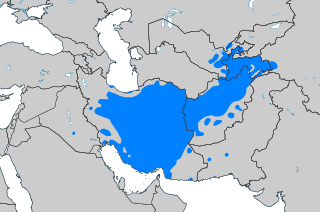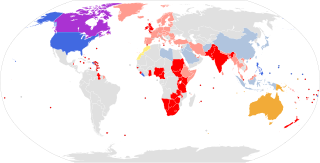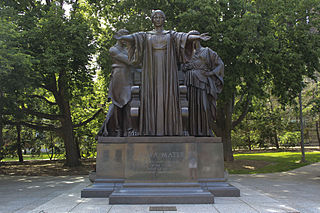Related Research Articles

Economics is the social science that studies the production, distribution, and consumption of goods and services.

An encyclopedia, encyclopædia, or encyclopaedia is a reference work or compendium providing summaries of knowledge either general or special to a particular field or discipline. Encyclopedias are divided into articles or entries that are arranged alphabetically by article name or by thematic categories, or else are hyperlinked and searchable by random access. Encyclopedia entries are longer and more detailed than those in most dictionaries. Generally speaking, encyclopedia articles focus on factual information concerning the subject named in the article's title; this is unlike dictionary entries, which focus on linguistic information about words, such as their etymology, meaning, pronunciation, use, and grammatical forms.

Persian, also known by its endonym Farsi, is a Western Iranian language belonging to the Iranian branch of the Indo-Iranian subdivision of the Indo-European languages. Persian is a pluricentric language predominantly spoken and used officially within Iran, Afghanistan and Tajikistan in three mutually intelligible standard varieties, namely Iranian Persian, Dari Persian and Tajiki Persian. It is also spoken natively in the Tajik variety by a significant population within Uzbekistan, as well as within other regions with a Persianate history in the cultural sphere of Greater Iran. It is written officially within Iran and Afghanistan in the Persian alphabet, a derivation of the Arabic script, and within Tajikistan in the Tajik alphabet, a derivation of the Cyrillic script.

Geneva is the second-most populous city in Switzerland and the most populous city of Romandy, the French-speaking part of Switzerland. Situated in the south west of the country, where the Rhône exits Lake Geneva, it is the capital of the Republic and Canton of Geneva.

Nicolaus von Amsdorf was a German Lutheran theologian and an early Protestant reformer. As bishop of Naumburg (1542–1546), he became the first Lutheran bishop in the Holy Roman Empire.
Old English, or Anglo-Saxon, is the earliest recorded form of the English language, spoken in England and southern and eastern Scotland in the early Middle Ages. It was brought to Great Britain by Anglo-Saxon settlers in the mid-5th century, and the first Old English literary works date from the mid-7th century. After the Norman conquest of 1066, English was replaced, for a time, by Anglo-Norman as the language of the upper classes. This is regarded as marking the end of the Old English era, since during this period the English language was heavily influenced by Anglo-Norman, developing into a phase known now as Middle English in England and Early Scots in Scotland.

Edward the Confessor was one of the last Anglo-Saxon English kings. Usually considered the last king of the House of Wessex, he ruled from 1042 to 1066.
Oxford University Press (OUP) is the university press of the University of Oxford. It is the largest university press in the world, and its printing history dates back to the 1480s. Having been officially granted the legal right to print books by decree in 1586, it is the second oldest university press after Cambridge University Press.

The Dictionary of National Biography (DNB) is a standard work of reference on notable figures from British history, published since 1885. The updated Oxford Dictionary of National Biography (ODNB) was published on 23 September 2004 in 60 volumes and online, with 50,113 biographical articles covering 54,922 lives.
Folk etymology is a change in a word or phrase resulting from the replacement of an unfamiliar form by a more familiar one. The form or the meaning of an archaic, foreign, or otherwise unfamiliar word is reinterpreted as resembling more familiar words or morphemes.

Despite the various English dialects spoken from country to country and within different regions of the same country, there are only slight regional variations in English orthography, the two most notable variations being British and American spelling. Many of the differences between American and British English date back to a time before spelling standards were developed. For instance, some spellings seen as "American" today were once commonly used in Britain, and some spellings seen as "British" were once commonly used in the United States.

The Dictionary of Greek and Roman Biography and Mythology is an encyclopedia/biographical dictionary. Edited by William Smith, the dictionary spans three volumes and 3,700 pages. It is a classic work of 19th-century lexicography. The work is a companion to Smith's Dictionary of Greek and Roman Antiquities and Dictionary of Greek and Roman Geography.

The chairperson is the presiding officer of an organized group such as a board, committee, or deliberative assembly. The person holding the office, who is typically elected or appointed by members of the group, presides over meetings of the group, and conducts the group's business in an orderly fashion.

The Dictionary of New Zealand Biography (DNZB) is an encyclopedia or biographical dictionary containing biographies of over 3,000 deceased New Zealanders. It was first published as a series of print volumes from 1990 to 2000, went online in 2002, and is now a part of Te Ara: The Encyclopedia of New Zealand. The dictionary superseded An Encyclopaedia of New Zealand of 1966, which had 900 biographies. The dictionary is managed by the Ministry for Culture and Heritage of the New Zealand Government. An earlier work of the same name in two volumes containing 2,250 entries, published in 1940 by Guy Scholefield with government assistance, is unrelated.

Philosophy is the systematized study of general and fundamental questions, such as those about existence, reason, knowledge, values, mind, and language. Such questions are often posed as problems to be studied or resolved. Some sources claim the term was coined by Pythagoras ; others dispute this story, arguing that Pythagoreans merely claimed use of a preexisting term. Philosophical methods include questioning, critical discussion, rational argument, and systematic presentation.
In the history of Christianity, the first seven ecumenical councils include the following: the First Council of Nicaea in 325, the First Council of Constantinople in 381, the Council of Ephesus in 431, the Council of Chalcedon in 451, the Second Council of Constantinople in 553, the Third Council of Constantinople from 680–681 and finally, the Second Council of Nicaea in 787.

An alumnus (masculine) or an alumna (feminine) of a college, university, or other school is a former student who has either attended or graduated in some fashion from the institution. The word is Latin and simply means "one who is being nourished". The plural is alumni for men and mixed groups and alumnae for women. The term is not synonymous with "graduate"; one can be an alumnus without graduating. The term is sometimes used to refer to a former employee or member of an organization, contributor, or inmate.
References
 This article incorporates text from a publication now in the public domain : Chambers, Ephraim, ed. (1728). "Amsdorfians". Cyclopædia, or an Universal Dictionary of Arts and Sciences (1st ed.). James and John Knapton, et al.
This article incorporates text from a publication now in the public domain : Chambers, Ephraim, ed. (1728). "Amsdorfians". Cyclopædia, or an Universal Dictionary of Arts and Sciences (1st ed.). James and John Knapton, et al.- Charles Buck, Theological Dictionary